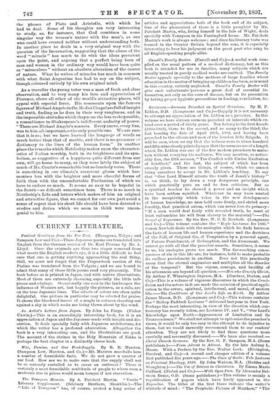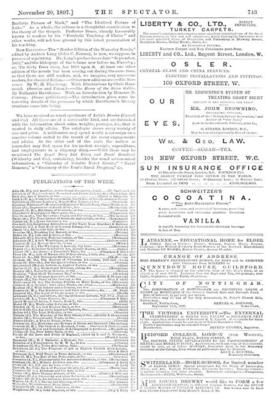SERMONS.—Sermons Preached on Special Occasions. By H. P. Liddon, D.D.
(Longmans and Co.)—Happily it is not necessary to attempt an appreciation of Dr. Liddon as a preacher. In this volume we have sixteen sermons preached at intervals which ex- tend over a period of thirty years. Ten belong to the first decade (1360-1869), three to the second, and as many to the third, the last bearing the date of April 28th, 18S9, and having been preached to the officers and men of the London Rifle Brigade. It will be seen, when we say that the volume runs to three hundred and fifty-nine closely printed pages, that the sermons are of a length which Dr. Liddon was one of the few modern preachers to main- tain without wearying his audience. We may mention, as notice- ably fine, the fifth sermon, " The Conflict with Undue Exaltation of Intellect," and the last, the subject of which has been already given. There are things, of course, which we cannot bring ourselves to accept in Dr. Liddon's teaching. To say that "Our Lord Himself attests the truth of Jonah's history" is, we think, to lay down a very dangerous principle, one which practically puts an end to free criticism. But as a spiritual teacher he showed a power and an insight which have been seldom equalled. Whatever he may have wanted in the receptivity which takes in the new developments of human knowledge, no man held more firmly, and stated more forcibly, that practical axiom, which can never lose its primacy : " If a man would deal fairly with revealed truth, he must at least enfranchise his will from slavery to the material."—The Gospel of Experience. By the Rev. W. C. E. Nowbolt. (Longmans and Co.)—This volume contains the " Boyle Lectures for 1895." Canon Newbolt deals with the analogies which he finds between the facts of human life and human experience and the doctrines of the Fall, of Original Sin, of Temptation by a personal agent, of Future Punishment, of Redemption, and the Atonement. We cannot go with all that the preacher asserts. Sometimes, it seems to us, his analogies prove too much. The far-reaching conse- quences of sin in this life are, for instance, held to make probable its endless punishment in another. Does not this practically mean that the eternal emphasises and multiplies all the disorder of the temporal ? But the vigour, courage, and lucidity of his utterances are beyond all question.—Men who Crucify Christ. By Arthur F. Winnington Ingram, M.A. (Gardner, Darton, and Co.)—This is a volume of vigorous discourses in which the Cruci- fixion and the actors in it are made the occasion of practical appli- cation to the errors, spiritual, intellectual, and moral, of modern life.—The Conditions of Our Lord's Life on Earth. By Arthur James Mason, D.D. (Longmans and Co.)—This volume contains the " Bishop Paddock Lectures " delivered last year in New York. Perhaps the most interesting, in view of the direction which con- troversy has recently taken, are Lectures IV. and V., " Our Lord's Knowledge upon Earth—Appearances of Limitation and its Transcendence." We shall not attempt to epitomise the preacher's views, it would be only too easy in the attempt to do injustice to them, but we would earnestly recommend them to our readers' attention. They are not likely to find these questions more carefully and reverently discussed.—We have also received :— Christ Church Sermons. Ry the Rev. G. F. Sampson, M.A. (Same publishers.)—From Advent to Advent. By the late Aubrey L. Moore. With a Preface by the Rev. Walter Lock. (Rivington, Percival, and Co.)—A second and cheaper edition of a volume first published five years ago.—The Cure of Souls : Yale Lectures on Practical Theology, 1896. By John Watson, M.A. (Hodder and Stoughton.)—The Use of Science to Christians. By Emma Marie Caillard. (Nisbet and Co.)—With Open Face. By Alexander Bal- main Bruce, O.D. (Same publishers.)—This volume is mainly a republication of papers which have lately appeared in the Expositor. The titles of the first three indicate the writer's attitude of mind : " The Prophetic Picture of Matthew;' " The
Realistic Picture of Mark," and "The Idealised Picture of Luke." As a whole, the volume is a thoughtful contribution to the theory of the Gospels. Professor Bruce, already favourably known to readers by his " Parabolic Teaching of Christ " and other works, will not lose ground by this latest presentation of his teaching.























































 Previous page
Previous page